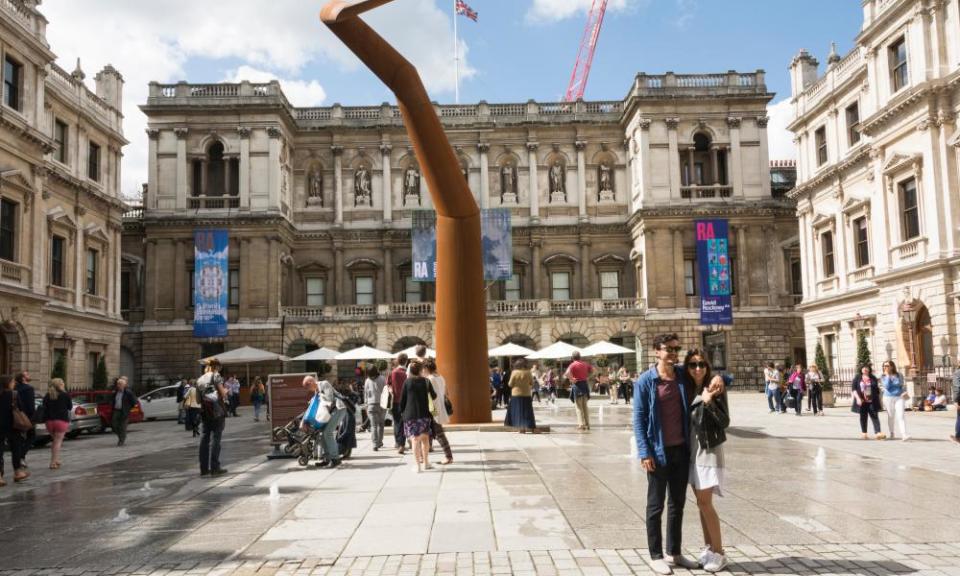Under threat: the birthplace of Darwin’s historic theory

Some of Britain’s most distinguished learned societies say they may be forced to leave their central London premises because the government has imposed rent rises of more than 3,000% over the past few years.
Last week the Geological Society and the Linnean Society announced that they had united with the Society of Antiquaries in a campaign to try to stop the government pricing them out of their premises at Burlington House, on Piccadilly, where they have been since 1854.
“In 2012, our annual rent was £4,000,” said Sandra Knapp, president of the Linnean Society. “By last year, it had risen to £130,000 – that‘s an increase of more than 3,000%. If rises continue at this rate we will have to relocate.”
The Linnean Society is the world’s oldest society devoted to natural history. Its building was the setting, in 1858, for the first reading of papers by Charles Darwin and Alfred Russel Wallace that outlined the theory of evolution by natural selection – a set of ideas that have since transformed our understanding of the natural world and humanity’s place in it.
The learned societies – which also include the Royal Astronomical Society and the Royal Society of Chemistry – are housed in three buildings around the main courtyard of Burlington House, home of the Royal Academy of Arts (which is unaffected by the current rent row).
“These buildings were built specifically for the use of the learned societies by Queen Victoria’s government to create a cultural hub in central London,” added Knapp. “Now that intellectual centre is under threat.”
The warning was backed by Bob Ward, who is policy director at the Grantham Research Institute on Climate Change and the Environment, and a fellow of the Geological Society, which is home to a world-famous library and map collection and hosts regular discussions about climate change and the future of the fossil fuel industries.
“Pricing these learned societies out of their homes suggests Boris Johnson’s government does not respect Britain’s extraordinary scientific heritage, even as it attempts to project an image of global Britain after Brexit,” said Ward. “But instead it is acting as if it was just another ruthless landlord, trying to maximise the rental income from a central London location.”
The Society of Antiquaries of London, set up in 1707, also houses a range of treasures. Among the 40,000 objects and 130,000 rare books it has amassed are three of the earliest copies of the Magna Carta, a range of Neolithic stone tools from Stonehenge, Tudor portraits and other precious historical items.
However, the society has warned that if it is forced by the government to move, it will have to pay substantial amounts to ensure the safe transfer of its fragile collection – and that the cost of that move could force it to sell off some of its treasures to foot the relocation bill. The society’s president, Paul Drury, has said the prospect fills him with “absolute horror”.
These societies play vital roles in promoting science – from natural history to astronomy – in schools and in society
Sandra Knapp, Linnean Society
The big increases in Burlington House rents are the result of a change in government accounting policy in 2014, when it decreed that the building was to be treated as an investment property. Shortly after this decision was made, the market value of property in the West End – by which rents are calculated – soared. As a result, annual rents have spiralled rapidly from a few thousand pounds a year to hundreds of thousands.
For its part, the government argues that the societies housed at Burlington are still paying rents that fall well below market rates for central London. However, it has also insisted that it is sympathetic to their position and has claimed that the Ministry of Housing, Communities and Local Government is now exploring solutions that could still deliver value for taxpayers while helping the societies to remain at Burlington House.
However, Knapp said the societies had seen very little sign of such activity. “We need the ministry, our landlords, to actually sit down with us and come up with an affordable and sustainable solution,” she said.
This point was backed by Conservative MP Tim Loughton, who is leading a cross-party group of MPs who support the Burlington House campaign. The ministry must, as a matter of urgency, secure a long-term deal for the societies or risk losing them for good, he warned last week.
“The societies at Burlington House are an asset to the nation. Together, their expertise and networks underpin our climate effort and major engineering projects essential to building back better,” he said.
“They are home to irreplaceable artefacts of great scientific and historical importance and are responsible for inspiring the next generation of scientists.”
Knapp added that the crucial point was that all these societies play vital roles in promoting science – from natural history to geology and from chemistry to astronomy – in schools and in society.
“Our co-location in the centre of London is a real strength,” she said, “and also an indication that this country takes its science very seriously and recognises that it is something Britain is proud to support.”

 Yahoo Finance
Yahoo Finance 